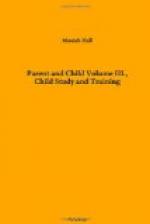You remember in “Pilgrim’s Progress” that when Christian had left the Interpreter’s House, he strayed away and went down into the Valley of Humiliation, where he walked between the snares and was in danger of falling into many a pitfall; there he wandered through darkness; there he could not see the Delectable Mountains any more, and there he fought with Giant Apollyon for his life; but when Christian passed that way he did not find it half so bad by any means. He had a companion by the name of Great Heart, remember, and Great Heart said to him, “Do you know that the soil of this valley is probably the most fertile that the crow flies over?”
The Valley of Humiliation, my friends, stretches sharp and clear athwart the life of every man and woman between the Interpreter’s House of his early education and of his dreams and visions, and the Delectable Mountains, and we all have to depart to it whether we will or no, and it is the most fertile soil that the crow flies over, for in that Valley of Humiliation men’s muscles and nerves become steel, and man becomes the shadow of the great rock in the Weary Land, and through heartaches the man and the woman are made the soldiers and the choice heroes of Jehovah Himself. It is into that Valley of Humiliation that the boy and the girl are going to go from school after they leave you, and you must fit them for it; many of you know well enough what it is and know what help they need.
You have read, all of you, a good many times probably, this marvelous passage from Isaiah: “They that trust in the Lord shall renew their strength; they shall mount up with wings as eagles; they shall run, and not be weary; and they shall walk, and not faint.” I never thought what that meant until one morning in college chapel our president turned to us and said: “Most of you think that is an anti-climax,” and we would say: “Why, of course, for a man cannot fly like the eagle. He can walk down hill, what is the use talking about that walking down hill.” The old man shook his head and said: “No, no. Anybody can fly like an eagle in his imagination; when we are beginning any new work or any new study or anything new, we fly; but after a time we cannot fly any more, we come down to a run; and the man who wins out is not the man who can run, but the man who can ’walk and not faint,’ for that man has the endurance that we want.”
There was a time some years ago—that has gone by too, thank fortune—when we used to paraphrase things; that is, turn very good English into very bad English. You wish to have a boy or girl catch the spirit of the poem, do you not, to find in it inspiration and power, to find a beauty in life that never was on sea nor land? A sweet voice is a very excellent thing in a woman, and a very unusual thing in a man. The eye is not the grandest sense organ we have; the ear is the path-way to the heart, and that is what you want to understand. Did you ever try reading a beautiful poem or story




